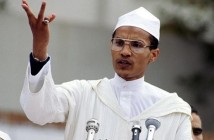
Moroccan protests continue for and against constitutional reforms
TANGIER, Morocco, July 4 (Reuters) – Thousands of people protested
in Morocco on Sunday over constitutional reforms they said did not go
far enough, but an official said they were out-numbered by people
demonstrating in support of the changes.
Morocco’s King Mohammed handed over some of his powers to elected
officials in a referendum viewed in other Arab monarchies as a test
case for whether reform can hold back the wave of “Arab Spring”
uprisings sweeping the region.
The king’s reforms were endorsed by 98.5 percent of people who voted
in the referendum on Friday, according to the interior ministry, but
opponents say the figures were inflated.
Protesters marched through a working class district of Tangier,
about 450 km (280 miles) north of the capital, chanting “The Interior
Minister is a liar!.”
They also carried empty boxes and shouted “Empty, empty, the ballot
boxes were empty!”
A Reuters reporter estimated the protesters, in the Beni Mekada
suburb of Tangier, numbered about 10,000. But an interior ministry
official said there were only 1,000 opposition demonstrators in the
city while 3,000 protested in favour of the reform.
“We wanted to send a message that even after the fraudulent
referendum, we are still here,” said Khalid Laasri, who was taking
part in the opposition march.
There was no sign of uniformed police officers around the march.
DEMOCRATIC MODEL?
The February 20 opposition movement — inspired by uprisings which
ousted leaders in Tunisia and Egypt — has been holding regular
protests for months, but Sunday’s demonstrations were the first since
the referendum.
Backers of the constitutional changes said they were a model for
democratic reform in the Arab world. The result of the referendum was
welcomed by the European Union and former colonial power France, which
said it was “historic.”
Opponents said the changes did not go far enough because they left
the palace in control of security, defence and religious issues and
did not tackle graft in the government.
“A farmer needs to clear stones and weeds before he ploughs the
land. With this reform, we plough without ridding the country of
corrupt people,” said Abdelali, a 42-year-old real estate entrepreneur
in Tangier.
The majority of Moroccans revere the king and the protest movement
has failed to gather the momentum or widespread support that toppled
leaders in Egypt and Tunisia.
The February 20 movement also organised demonstrations on Sunday in
the capital, Rabat, and in Casablanca, Morocco’s biggest city. There
were contradictory accounts of the numbers involved.
A Reuters reporter in Rabat said he saw about 4,000 protesters, with
police keeping them apart from several hundred government supporters.
The interior ministry official said the protesters numbered 1,500.
In Casablanca, February 20 activists said 20,000 people turned out
to protest the referendum. A local council member said there were
8,000 demonstrators with a few hundred counter-protesters.
The interior ministry official said 20,000 people demonstrated in
Casablanca in favour of the reform. (Additional reporting by Mark John
in Rabat; Writing by Christian Lowe; Editing by Jon Boyle






